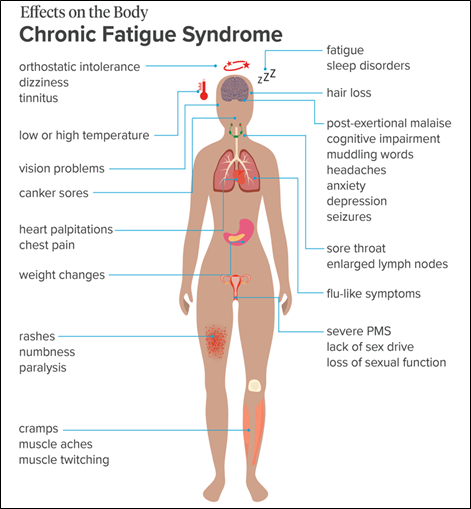Chronic fatigue syndrome
Context
Recently, a woman from Bengaluru has filed a petition in the Delhi High Court to stop her Noida-based friend, who has been suffering from Chronic Fatigue Syndrome since 2014, from travelling to Europe to undergo a physician-assisted euthanasia.
About
Chronic Fatigue Syndrome:
- Chronic Fatigue Syndrome is also known as myalgic encephalomyelitis (ME/CFS).
- According to the US Centres for Disease Control and Prevention (CDC), it is a serious and debilitating disease that affects the nervous system, the immune system and the body’s production of energy.
Causes of ME/CFS
It's not known what causes ME/CFS, but there are a number of theories – for example, it may be triggered by an infection, or certain factors could make you more likely to develop the illness.
Suggested causes or triggers for ME/CFS include:
- viral infections, such as glandular fever
- bacterial infections, such as pneumonia
- problems with the immune system
- a hormone imbalance
- genes – ME/CFS seems to be more common in some families
Diagnosis: There is no specific test for the disease, and doctors have to rely on medical examinations, blood and urine tests. ME/CFS can affect anyone, from children to adults of all ages.
Symptoms:
- The biggest telltale symptom is a significantly lowered ability to do activities that were performed before the illness.
- The fatigue is not relieved by sleep or rest and exercising usually makes the symptoms worse.
- Other symptoms include trouble sleeping, difficulty in thinking, memory retention and concentration, dizziness/lightheadedness, headaches, muscle pain, joint ache, flu-like symptoms, tender lymph nodes and digestive issues.
- The most recognizable symptom is post-exertional malaise (PEM).
- Patients often describe it as a “crash” in physical/mental energy following even minor activities like grocery shopping or brushing teeth.
Treatment:
- As of yet, there is no specific cure or approved treatment. Instead, doctors recommend ways to deal with the symptoms of the disease.
- Treatments include:
- Cognitive behavioural therapy (CBT)
- energy management
- medicine to control symptoms such as pain and sleeping problems
- Some people with ME/CFS will improve over time, especially with treatment.
- Many people with ME/CFS will need to adapt their daily routine and pattern of activities on a long-term basis. There may be periods when your symptoms get better or worse.






